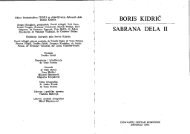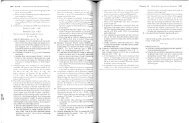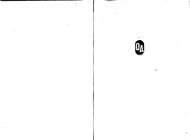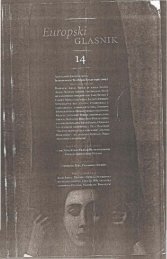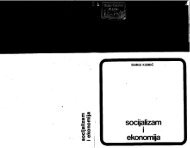Daniel l. Rubinfeld
Daniel l. Rubinfeld
Daniel l. Rubinfeld
You also want an ePaper? Increase the reach of your titles
YUMPU automatically turns print PDFs into web optimized ePapers that Google loves.
362 Part 3 Market Structure and Competitive Strategy<br />
3. Through private proceedillgs. Individuals or companies can sue for treble<br />
fold) damages inHicted on their businesses or property, The possibility of ha".;<br />
ing to pay treble damages can be a strong deterrent to 'would-be Violators<br />
Individuals or companies can also ask the courts for injunctions to forc~<br />
wrongdoers to cease anticompetiti\'e actions.<br />
US antitrust laws are more stringent and far-reaching than those of most<br />
other countries. In fact, some people ha\'e argued that they ha\'e prevented<br />
American industry from competing effecti\-ely in international markets. The<br />
la,'\'s certainly constrain American business and may at times ha\-e put Americari<br />
firms at a disadvantage in world markets. But this must be 'weighed against their<br />
benefits: Antitrust laws han~ been crucial for maintaining competition, and Com.<br />
petition is essential for economic efficiency, irmo\'ation, and growth.<br />
In 1981 and early 1982, American Airlines and Braniff Airways were competing<br />
fiercely with each other for passengers, A fare vvar broke out as the firms<br />
undercut each other's prices to capture market share. On February 21, 1982,<br />
Robert Crandall, president and CEO of American, made a phone call to<br />
Howard Puh1am, president and chief executive of Braniff. To Crandall's later<br />
surprise, the call had been taped. It went like this: 21<br />
Crmldall: I think it's dumb as hell for Ou'ist's sake, all right, to sit here and<br />
pound the @!#S%&! out of each other and neither one of us making a<br />
@!#S%&! dime.<br />
Plltllam: Well ...<br />
Cmlldall: I mean, you know, @!#S%&!, what the hell is the point of it<br />
Putllam: But if vou're aoina to overlav every route of American's on top of<br />
• tJ tJ .-<br />
every route that Braniff has-I just can't sit here and allow you to bury us<br />
without giving our best effort<br />
Crmldall: Oh sure, but Eastern and Delta do the same thing in Atlanta and<br />
have for years.<br />
Putllam: Do you have a suggestion for me<br />
Clmldall. Yes, I have a suggestion for YOlL Raise your @!#$%&! fares 20 percent<br />
I'll raise mine the next morning.<br />
Putllam: Robert, we ...<br />
Cmlldall: You'll make more money and I will, too.<br />
Putllam: We can't talk about pricing!<br />
Crmldall: Oh @!#$%&!, Ho'ward. We can talk about any @!#S%&! thing we<br />
want to talk about.<br />
Crandall was vvrong. Corporate executives cannot talk about anything they<br />
want. Talking about prices and agreeing to fix them is a clear \'iolation of<br />
Section 1 of the Sherman Act Putnam must ha\'e kno'wn this because he<br />
promptly rejected Crandall's suggestion. After learning about the call, t~e<br />
Justice Deparhrlent filed a suit accusing Crandall of violating the antitrust laws<br />
by proposing to fix prices.<br />
21 According to the Nnl' York TilllfS, February 2e1, 1983<br />
However, proposing to fix prices is not enough to violate Section 1 of the<br />
Shennan Act: For the lmv to be violated, the two parties must agree to collude.<br />
Therefore, because Puh1am had rejected Crandall's proposal, Section 1 was not<br />
violated. The court later ruled, however, that a proposal to fix prices could be<br />
an attempt to monopolize part of the airline industry and, if so, would violate<br />
Section 2 of the Sherman Act. American Airlines promised the Justice<br />
Department never again to engage in such acti\'ity.<br />
Over the past decade, Microsoft Corporation has grown to become the<br />
largest computer sofhvare company in the world. Its Windows operating<br />
System has over 90 percent of the worldwide market for personal computer<br />
o'perating systems. Microsoft also dominates the office productivity market: Its<br />
Office Suite, which includes Word (word processing), Excel (spreadsheets), and<br />
Powerpoint (presentations) held over a 90 percent worldwide market share<br />
in 1999.<br />
Microsoft's incredible success has been due in good part to the creative technological<br />
and marketing decisions of the company and its CEO, Bill Gates. Is<br />
there anything wrong as a matter of either economics or law with being so successful<br />
and dominant It all depends. Under the antitrust la'ws, efforts by firms<br />
to restrain trade or to engage in activities that inappropriately m~intain<br />
monopolies are illegaL Did Microsoft engage in anticompetitive, illegal<br />
practices<br />
The U.s. Government says yes; Microsoft disagrees. In October 1998, the<br />
Antitrust Division of the U.s. Department of Justice (DO}) put Microsoft's<br />
behavior to the test: It filed suit, raising a broad set of issues that created the<br />
most significant antitrust law suit of the past two decades. The ensuing trial<br />
ended in June 1999, but in the absence of any settlement between the aovern-<br />
• tJ<br />
ment and Microsoft, the final chapter of the story is unlikely to be written for<br />
years to come. Here is a brief road map of some of the DOl's major claims and<br />
Microsoft's response.<br />
III DOJ claim: Microsoft has a great deal of market power in the market for PC<br />
operating systems-enough to meet the legal definition of monopoly power.<br />
III MS response: Microsoft does not meet the legal test for monopoly power<br />
because it faces significant threats from potential competitors that offer or<br />
will offer platforms to compete with Windows.<br />
II DOJ claim: Microsoft \-iewed Netscape's Internet browser (Netscape<br />
Navigator) as a threat to its monopoly over the PC operating system market.<br />
The threat exists because Netscape's browser includes Sun's Java sofh,\rare,<br />
which can run programs that have been 'written for allY operating system,<br />
including those that compete with Windows, such as Apple, Unix, and<br />
Linux. In violation of Section 1 of the Sherman Act, Microsoft entered into<br />
exclusionary agreements with computer manufacturers, Internet service<br />
providers, and Internet content providers with the objecti\'e of raising the<br />
cost to Netscape of making its browser available to consumers. This action<br />
impaired Netscape's ability to compete fairly with Microsoft's Internet<br />
Explorer for the browser business.<br />
Chapter 10 Market Power:. Monopoly and Monopsony 363






